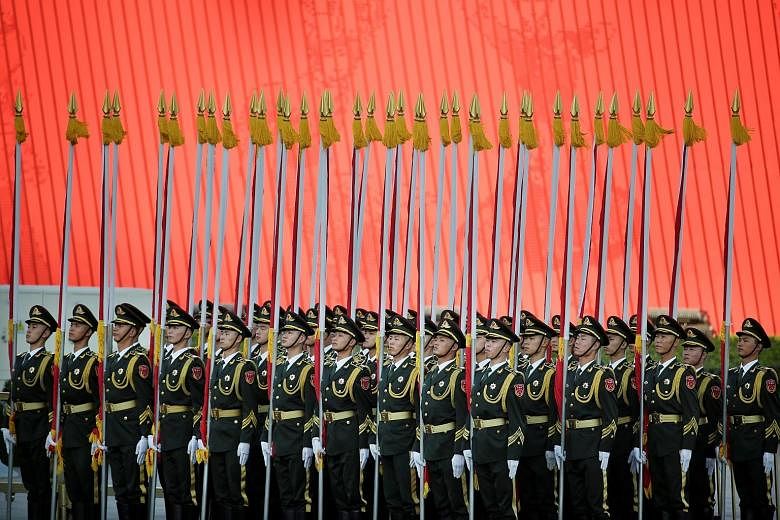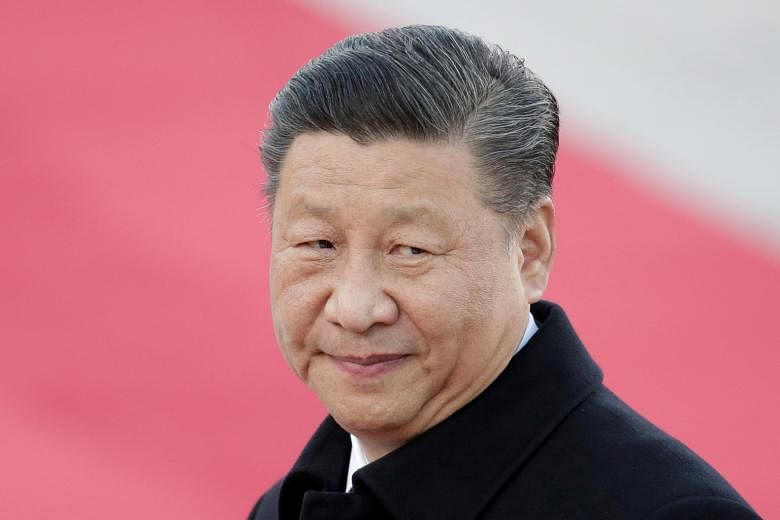BEIJING • China's Communist Party elite kicked off a key meeting in Beijing yesterday, as the country's leadership faces pro-democracy protests in Hong Kong, a protracted trade war with the US, and a slowing economy.
The Fourth Plenum of the Party's Central Committee is a closed-door meeting where high-ranking officials discuss the country's road map and future direction.
The official news agency Xinhua said President Xi Jinping delivered a work report on behalf of the Central Committee's Political Bureau, and "explained a draft document" of Central Committee decisions on "some major issues".
These included how to "uphold and improve the system of socialism with Chinese characteristics and advance the modernisation of China's system and capacity for governance", Xinhua added.
The term governance is about "strengthening the party's control over all governing organs", said Mr Jude Blanchette, an expert on Chinese politics at the Centre for Strategic and International Studies.
The likely outcome of this week's meetings "will be that the CCP (Chinese Communist Party) is more firmly entrenched at the core of political and governing power", he wrote last Friday.
It is key for Beijing to use the event to cast its political system as meritocratic, unchallengeable and superior to Western democracy, said Professor Wang Jiangyu, director of the National University of Singapore's Asian Law Institute.
"China's party-state wants to show its political system is more attractive overseas, and others should stop their finger-pointing."
Party leaders have repeatedly warned that, without communist rule, China would descend into chaos and fall prey to hostile Western powers. In September, Mr Xi said China was entering a period of "concentrated risks" - economic, political and diplomatic - and the country must be ready to fight.
The key conclave will run until Thursday. It is the first since February last year. Many of the country's most significant policies have been announced after plenum meetings, with the last one focused on a reform plan for state institutions, giving even more power to the party.
The one before that approved the scrapping of presidential term limits, allowing Mr Xi, 66, to stay in office for life.
The push to "modernise" China's governance and party, and state-run institutions comes as Beijing battles international and domestic issues on multiple fronts.
In Hong Kong, the Chinese central government has been shaken by months of anti-Beijing unrest by pro-democracy protests.
A slowing economy - exacerbated by a trade war with the US - is also weighing on Chinese leaders, with the country's gross domestic product growth hitting its slowest rate in nearly three decades in the third quarter.
Other domestic issues, such as environmental deterioration and economic disparity between rural and urban areas, are also driving the need for institutional "transformation", wrote the state-run China Daily yesterday.
This week's long-awaited conclave also ends a significant delay between sessions - the longest hiatus since 1977, according to experts - as the CCP's Constitution mandates at least one plenum per year.
But analysts say it is unlikely the delay was due to opposition to Mr Xi within the party. The Chinese leader's power was on full display just a few weeks ago during a massive military parade commemorating 70 years of Communist Party rule, said Mr Blanchette.
"Since the Third Plenum, Xi has convened two extraordinary meetings of all the top party, state and military leaders," Mr Bill Bishop, publisher of the Sinocism China Newsletter, wrote last week. The ability to call such high-profile meetings reflects Mr Xi's power and authority, he added.
AGENCE FRANCE-PRESSE, REUTERS


